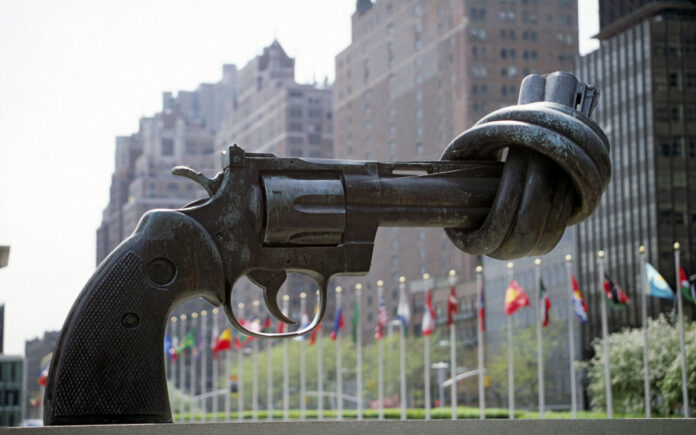UN, New York: The United Nations Security Council voiced serious concern on Monday after multiple UN peacekeeping positions in southern Lebanon came under fire during clashes between Israeli forces and Hezbollah militants, backed by Iran.
In a consensus statement, the 15-member council emphasized the need for all parties to prioritize the safety and security of personnel and premises of the U.N. peacekeeping mission in Lebanon, known as UNIFIL. While no parties were named directly, the council underscored that “U.N. peacekeepers and U.N. premises must never be the target of an attack” and reaffirmed its backing of UNIFIL’s critical role in maintaining regional stability.
The Security Council also urged the full implementation of its 2006 resolution 1701, which sought to maintain peace along the Lebanon-Israel border. However, no specific actions were outlined for advancing the resolution’s goals, though the council acknowledged the need for “further practical measures.”
Since Israel launched its ground operations in Lebanon on October 1, UNIFIL positions have been hit 20 times, according to U.N. reports. The incidents include direct fire and a recent event where two Israeli tanks broke through the gates of a UNIFIL base. “Five peacekeepers have been injured, including one who sustained a bullet wound,” U.N. spokesperson Stephane Dujarric stated on Monday, adding that the source of the gunfire remains unconfirmed by UNIFIL.
For two weeks, Israel has called on U.N. peacekeepers to retreat 5 kilometers (3 miles) from the Blue Line—the U.N.-mapped border separating Lebanon from Israel and the Israeli-occupied Golan Heights—citing safety concerns. Israeli Prime Minister Benjamin Netanyahu urged U.N. Secretary-General Antonio Guterres on Sunday to withdraw UNIFIL from the area.
However, U.N. peacekeeping chief Jean-Pierre Lacroix responded that U.N. troops would remain in place. After briefing the Security Council, Lacroix told reporters that contingency planning is ongoing, and the situation is under constant review. Lacroix also confirmed that he will meet with Israel’s U.N. Ambassador, Danny Danon, to discuss the matter further.
UNIFIL’s Mandate and Challenges
Deputy U.S. Ambassador Robert Wood stressed the importance of allowing UNIFIL to carry out its mission, as outlined in resolution 1701, which mandates U.N. forces to assist the Lebanese military in keeping southern Lebanon free of unauthorized armed personnel, weapons, or assets outside of government control.
Lacroix clarified that UNIFIL’s role is supportive, not preventative, in addressing hostilities, pushing back against suggestions that the mission failed to enforce resolution 1701. He emphasized, “UNIFIL was never mandated to implement 1701; it is meant to assist.”
Also Read | NVIDIA’s Jensen Huang Hails Elon Musk’s xAI Supercomputer as a ‘Superhuman’ Achievement
Last week, Israeli Ambassador Danon argued that both the Lebanese army and UNIFIL had failed to control the region, which prompted Israel to take direct action. “Our soldiers are now in the field, along the border in Lebanon, exposing and dismantling Hezbollah’s infrastructure,” Danon said.
The United States and France have reiterated that empowering Lebanon’s army is vital for the successful implementation of resolution 1701. However, Russia’s U.N. Ambassador, Vassily Nebenzia, expressed concerns about UNIFIL’s safety, stating, “UNIFIL is being jeopardized, and one country is openly threatening its personnel, which is unacceptable.”
Also Read | UK Grants Approval for Drone Inspections of Power Lines and Wind Turbines
Resolution 1701 also grants UNIFIL the authority to assist the Lebanese government in preventing the illicit transport of weapons into the country. Despite the resolution’s ban on crossing the Blue Line by ground or air, U.N. officials have reported frequent violations by both sides.
Danon urged the Security Council to ensure that the Lebanese army and UNIFIL meet their obligations, suggesting a “more robust mandate for UNIFIL to deter Hezbollah.” However, any changes to UNIFIL’s mandate would require approval from the Security Council. As of now, no discussions on altering the mandate are underway, with the current mission authorized until August 31, 2025.



